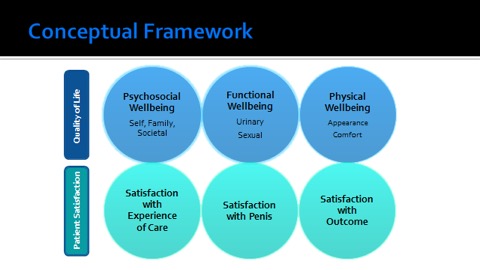Satisfaction and Quality of Life in Patients and Caregivers of Children with Hypospadias: A Qualitative Study
Daniel T. Keefe, MD1, Sonia Gulati, PhD2, Anne F. Klassen, DPhil3, Luis Guerra, MD1, Michael P. Leonard, MD1, Catherine Boutet, MD1, Mélise A. Keays, MD1.
1University of Ottawa, Ottawa, ON, Canada, 2Carleton University, Ottawa, ON, Canada, 3McMaster University, Hamilton, ON, Canada.
BACKGROUND: The measurement of patient-reported or caregiver-proxy reported outcomes (PRO) in hypospadias has been acknowledged to be important for improvement in quality of care, performance assessment and for comparative effectiveness research. Currently available PRO instruments have limited breadth of content and none have developed using qualitative interviews with patients. We aimed to describe how hypospadias and hypospadias surgery impacts on patient (and parent proxy) satisfaction and quality of life.
METHODS: Interview guides were developed based on a systematic review of hypospadias outcome measures and from a focus group of patients, caregivers, and lay and medical experts. Semi-structured interviews of 30 patients (age 7-18) and caregiver-proxies (including fathers with hypospadias) were conducted pre- or post-operatively. Post-operative patients included patients with and without surgical complications. Interviews were audio-recorded, transcribed verbatim and line by line coding by two reviewers allowed extraction of primary themes to develop a conceptual framework.
RESULTS: The patient and parent interviews revealed that hypospadias and hypospadias surgery impact patients and their families in six main areas: satisfaction with overall outcome; satisfaction with penis, functional wellbeing (both urinary and sexual); psychosocial wellbeing; physical wellbeing and overall satisfaction with experience of care. Themes emerging were similar in the parent and child interviews. Examples of subthemes in the experience of care included decision making, satisfaction with information, expectations, interactions with staff, experience with surgical and anesthetic teams, pain control and recovery. Psychosocial wellbeing was a broad concept including emotional and behavioral constructs such as self-confidence, feeling embarrassed, concealing behaviors and teasing. Parent psychological factors (expectations, motivators and children characteristics) are examples of other subthemes.
CONCLUSIONS: This hypospadias conceptual framework will guide item generation to create a caregiver proxy and a child/adult hypospadias patient reported outcome measure. The next steps in developing a PRO will include item reduction with expert feedback and cognitive debriefing interviews with parent-proxies and patients to ensure relevance and importance of final survey items. The finalized patient reported outcome measure will be field tested and validated against available gold standard objective scoring scales to be used as a clinical and research tool.
Back to 2017 Program
